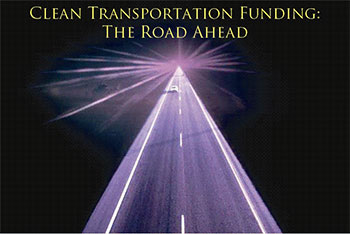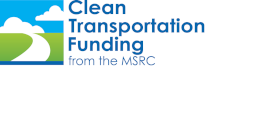 The Forum Clean Transportation Funding: The Road Ahead hosted by the MSRC and the South Coast Air Quality Management District on June 29 was an exciting one-day event that welcomed back former MSRC members to reflect upon the MSRC's achievements over the last 20 years. The nearly 100 guests also had the opportunity to hear from a variety of experts about what the current trends are in the alternative fuels and clean transportation arenas.
The Forum Clean Transportation Funding: The Road Ahead hosted by the MSRC and the South Coast Air Quality Management District on June 29 was an exciting one-day event that welcomed back former MSRC members to reflect upon the MSRC's achievements over the last 20 years. The nearly 100 guests also had the opportunity to hear from a variety of experts about what the current trends are in the alternative fuels and clean transportation arenas.
MSRC Chair Greg Winterbottom opened the forum by welcoming everyone to the event, held at the Cal State University, Los Angeles Campus. He remarked that it was wonderful to see such a great turnout especially from those who do not know a lot about the MSRC because the day would give them the chance to learn about the MSRC and its forward-thinking programs. John Longville, former Assembly Member and Chair of the MSRC from 1993-1998, formally kicked off the forum by looking back at the last 20 years of the MSRC. He recognized current and former MSRC members that were present, and talked about some of the most innovative projects the MSRC helped fund in its early days. "When we started the MSRC, we didn't realize how wonderful it would become. There was a network of communication and cooperation that is unusual and made things more effective," he said. He recommended to the audience that the time to get involved with the MSRC is when the work program is being developed. "This is the time when people can have the most influence," he noted.
The day's first panel discussed new technologies and strategies in alternative fuels and vehicles. Diane Wittenberg, who heads the California Plug-In Electric Vehicle Collaborative, Tim Carmichael, the Executive Director of the California Natural Gas Vehicle Coalition, and Catherine Dunwoody who runs the California Fuel Cell Partnership, as well as Tim Olson, a policy expert from the California Energy Commission, gave the audience their perspectives of where these markets are today and where they expect them to be in the future. The panelists agreed that increasing the number of alternative fuel vehicles on California's roads is integral to achieving the state's air quality goals, and that government policy will be important to advance alternative fuel technologies.
A conversation about the regulatory strategies needed to achieve state and local air quality goals was the focus of forum's second panel. Leaders from air quality and transportation agencies including AQMD Board Member Dr. Joe Lyou, who leads the Coalition for Clean Air, Peter Greenwald from the AQMD, MSRC who leads the Coalition for Clean Air, Peter Greenwald from the AQMD, MSRC Member and ARB Air Resources Engineer Earl Withycombe, and the head of the Western States Petroleum Association, Cathy Reheis Boyd, all concurred that major changes in transportation systems are coming, such as people relying less on their personal automobiles, and that agencies must incorporate this new way of thinking in their planning policies.
(Pictured at left, Congresswoman Judy Chu presents Greg Winterbottom with a Certificate of Congressional Recognition congratulating MSRC for its work of more than 20 years to improve air quality in the South Coast Air District)
Noted author and former CalEPA Secretary Terry Tamminen was the luncheon's Keynote speaker. He presented a grim look at the true cost of our oil addiction, but concluded his remarks on a high note by pointing to the increasing number of hybrids on the roads and the increasing use of alternative fuels by countries like Brazil and states like California. He said that by working together, we are more than the sum of our parts, so this is why the MSRC's work is so important.
The afternoon's final panel gave MSRC project partners the chance to share their success stories and illustrate how the MSRC's Clean Transportation Funding made a tangible difference for their projects. Marty Tufte, the Western Group Fleet Director for Waste Management, told the audience how the MSRC helped fund its first LNG station in Long Beach, as well as provided funding to convert older LNG stations to L/CNG over the years. John Thai, a traffic engineer from the City of Anaheim, discussed how MSRC funding enabled the city to partner with the City of Fullerton to implement a traffic signal synchronization project, which they weren't able to until the MSRC's funding made the project a reality. Finally, the audience heard from two small business owners - Charles Feder, owner Rossmoor Pastries, and Tim Nelligan, president of Go Natural Gas - who said that their CNG fueling dispensers would not have been possible without the MSRC. "The day was a great success," said Chair Greg Winterbottom. "It was nice to see old colleagues and meet new people to collaborate with on future projects. Our speakers were fantastic and gave the MSRC some important insight as to what is happening in the clean transportation field, as well as sparked some new ideas as to possible projects we could provide funding for in the future."
